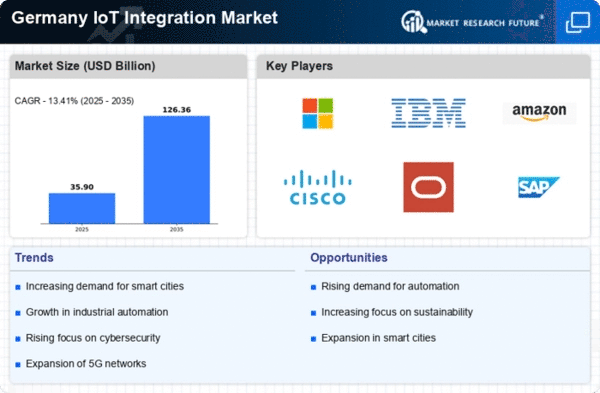Rising Demand for Automation
The iot integration market in Germany experiences a notable surge in demand for automation across various sectors. Industries are increasingly adopting IoT solutions to enhance operational efficiency and reduce costs. According to recent data, approximately 70% of German manufacturers are investing in IoT technologies to automate processes. This trend is driven by the need for real-time data analysis and improved decision-making capabilities. As automation becomes more prevalent, the integration of IoT systems is essential for seamless communication between devices, leading to optimized workflows. Consequently, the iot integration market is poised for growth as businesses seek to leverage automation to remain competitive in a rapidly evolving landscape.
Government Initiatives and Support
The German government plays a pivotal role in fostering the growth of the iot integration market through various initiatives and support programs. With a focus on digital transformation, the government has allocated substantial funding to promote IoT research and development. For instance, the Digital Strategy 2025 aims to enhance the country's digital infrastructure, which is crucial for IoT integration. This initiative is expected to boost investments in IoT technologies, with projections indicating a potential increase of 25% in market size by 2027. Such government backing not only encourages innovation but also creates a conducive environment for businesses to adopt IoT solutions, thereby driving the iot integration market forward.
Increased Connectivity and 5G Adoption
The advent of 5G technology significantly impacts the iot integration market in Germany, as it facilitates enhanced connectivity for IoT devices. With 5G networks offering higher speeds and lower latency, businesses can deploy IoT solutions that require real-time data transmission. This technological advancement is expected to lead to a 30% increase in IoT device adoption by 2026. As industries leverage 5G capabilities, the demand for effective integration solutions rises, prompting growth in the iot integration market. The ability to connect a vast number of devices seamlessly will likely transform operational processes across sectors, making IoT integration a critical component of future business strategies.
Focus on Sustainability and Energy Efficiency
Sustainability has become a central theme in the iot integration market, particularly in Germany, where there is a strong emphasis on energy efficiency. Businesses are increasingly adopting IoT solutions to monitor and optimize energy consumption, aligning with national goals for reducing carbon emissions. Recent studies suggest that IoT technologies can lead to energy savings of up to 20% in industrial applications. This focus on sustainability not only addresses environmental concerns but also enhances operational efficiency, making IoT integration a vital aspect of corporate strategies. As companies prioritize sustainable practices, the iot integration market is expected to grow, driven by the demand for eco-friendly solutions.
Growing Consumer Expectations for Smart Solutions
As consumers in Germany increasingly demand smart solutions, the iot integration market is experiencing a shift towards more personalized and efficient services. The rise of smart homes and connected devices has led to heightened expectations for seamless integration and user-friendly interfaces. Market Research Future indicates that over 60% of German households are expected to adopt smart home technologies by 2025. This trend compels businesses to invest in IoT integration to meet consumer demands for convenience and efficiency. Consequently, the iot integration market is likely to expand as companies strive to deliver innovative solutions that enhance the consumer experience and foster brand loyalty.
















